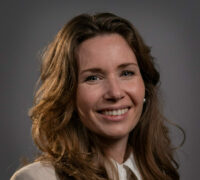
Connect with Copenhagen
Pascale Dychter, the Science Counselor at the Embassy of Switzerland in Copenhagen, explains her vision and role in connecting the dots in education, research, and innovation between Switzerland and Denmark.
What is your vision as the Science Counselor in Denmark for the next two years?
My main vision for the next two years is to fill the recently signed memorandum of understanding (MoU) between Switzerland and Denmark with meaningful substance. Federal Councillor Guy Parmelin and Denmark’s Minister of Higher Education and Science Christina Egelund signed the agreement in March this year to enhance cooperation between the universities, researchers, innovation stakeholders and funding bodies of both countries. The MoU is an important instrument to deepen our close collaboration with Denmark, but it will depend on us what we make out of it. My objective is to engage as many interested stakeholders as possible to establish a solid foundation for long-lasting collaboration in education, research, and innovation between Switzerland and Denmark.
What are the trending sectors wherein you can curate impactful collaborations with Switzerland?
The focus topics in the MoU are climate and sustainability, energy, life sciences and health, quantum science and technology, information and communications technology, artificial intelligence, materials and engineering sciences, space, as well as humanities and social sciences. Switzerland and Denmark are world leaders in life sciences and play an important role in the field of quantum science. The life science industry accounted for about 50’000 jobs in 2023 and approximately 22% of the Danish product exports.
Also the Danish quantum ecosystem is growing rapidly. On November 20, Denmark launched Quantum Denmark – a new hub for Danish quantum innovation. With its world-leading density of quantum graduates per capita, Denmark aims to attract top talent and entrepreneurs. Enhanced cooperation through the MoU will help unlock the vast potential of these technologies in both countries.
Another key priority is the green transition, where the Danish government places a strong emphasis on climate protection, sustainability, and its ambitious climate targets, including a 70% reduction in CO2 emissions within the next five years and climate neutrality by 2050.
How would it contribute towards the network's overall goal of #ConnectingTomorrow?
The three above mentioned topics of life science, quantum and green transition are from my point of view the big challenges of the future, where we need to team-up. There are several projects underway to test injecting captured CO2 into depleted offshore oil and gas fields in the North Sea, in which Switzerland also aims to establish framework conditions with its carbon capture und storage (CCS) technologies. Denmark’s first CO2 storage facility, part of Project Greensand, is ready to safely store large amounts of CO2 in the North Sea. The project, involving 23 partners, has successfully tested the capture, transport, and storage of CO2. The facility aims to store 400’000 tons of CO2 annually by 2025-2026, with plans to scale up to 8 million tons by 2030. This initiative positions Denmark as a leader in CCS, with significant economic benefits, including up to 9’000 jobs and an estimated DKK 50 billion (€ 6.7 billion) in revenue.
Lastly, how do you want your current and potential Swiss partners to be part of your journey / vision?
I hope that as many Swiss partners and stakeholders as possible can benefit from the MoU framework and fill the agreement with innovative and sustainable ideas. Denmark is an important European partner for Swiss researchers. During the last EU Framework Programme for Research and Innovation, Horizon 2020 (2014-2020), Swiss and Danish researchers worked together on over 600 projects. EUREKA, the initiative for cross-border innovation promotion in Europe, has supported over 60 cooperation projects with partners from both countries since it was founded in 1985.
Furthermore, comparative advantages for Denmark arise from the presence of well-funded foundations (e.g., the Novo Nordisk Foundation) that are able to initiate targeted initiatives and invest in innovative start-ups. However, we often get the feedback that Swiss start-ups are too modest compared to their international peers and should engage with potential customers much earlier to explore opportunities for collaboration. I would love to see an increase of these collaborations (by of course always preserving our Swiss “down-to-earth DNA”) and look forward to creating as many synergies as possible with all of you!
Connect with

Science Counselor at the Embassy of Switzerland in Copenhagen
Embassy of Switzerland in Copenhagen
Richelieus Allé 14
2900 Hellerup
Denmark